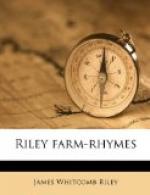And read! w’y, his own mother learnt him
how to read
and spell;
And “The Childern of the Abbey”—w’y,
he knowed that
book as well
At fifteen as his parents!—and “The
Pilgrim’s Prog-
ress,” too—
Jest knuckled down, the shaver did, and read ’em
through
and through.
At eighteen, Mother ’lowed the boy must have
a better
chance-
That we ort to educate him, under any circumstance;
And John he j’ined his mother, and they ding-donged
and
kep’ on,
Tel I sent him off to school in town, half glad that
he was
gone.
But—I missed him—w’y,
of course I did!—The Fall and
Winter through
I never built the kitchen-fire, er split a stick in
two,
Er fed the stock, er butchered, er swung up a gambrel-
pin,
But what I thought o’ John, and wished that
he was home
ag’in.
He’d come, sometimes—on Sund’ys
most—and stay the
Sund’y out;
And on Thanksgivin’-Day he ’peared to
like to be about:
But a change was workin’ on him—he
was stiller than
before,
And didn’t joke, ner laugh, ner sing and whistle
any
more.
And his talk was all so proper; and I noticed, with
a sigh,
He was tryin’ to raise side-whiskers, and had
on a striped
tie,
And a standin’-collar, ironed up as stiff and
slick as bone;
And a breast-pin, and a watch and chain and plug-hat
of
his own.
But when Spring-weather opened out, and John was to
come home
And he’p me through the season, I was glad to
see him
come,
But my happiness, that evening, with the settin’
sun went
down,
When he bragged of “a position” that was
offered him in
town.
“But,” says I, “you’ll not
accept it?” “W’y, of course I
will,”
says he.—
“This drudgin’ on a farm,” he says,
“is not the life fer
me;
I’ve set my stakes up higher,” he continued,
light and
gay,
“And town’s the place fer me, and
I’m a-goin’ right
away!”
And go he did!—his mother clingin’
to him at the gate,
A-pleadin’ and a-cryin’; but it hadn’t
any weight.
I was tranquiller, and told her ’twarn’t
no use to worry
so,
And onclasped her arms from round his neck round mine
—and
let him go!
I felt a little bitter feelin’ foolin’
round about
The aidges of my conscience; but I didn’t let
it out;—
I simply retch out, trimbly-like, and tuk the boy’s
hand,
And though I didn’t say a word, I knowed he’d
under-
stand.
And—well!—sence then the old
home here was mighty
lonesome, shore!
With me a-workin’ in the field, and Mother at
the door,
Her face ferever to’rds the town, and fadin’
more and
more—
Her only son nine miles away, a-clerkin’ in
a store!
The weeks and months dragged by us; and sometimes
the
boy would write
A letter to his mother, sayin’ that his work
was light,
And not to feel oneasy about his health a bit—
Though his business was confinin’, he was gittin’
used
to it.




